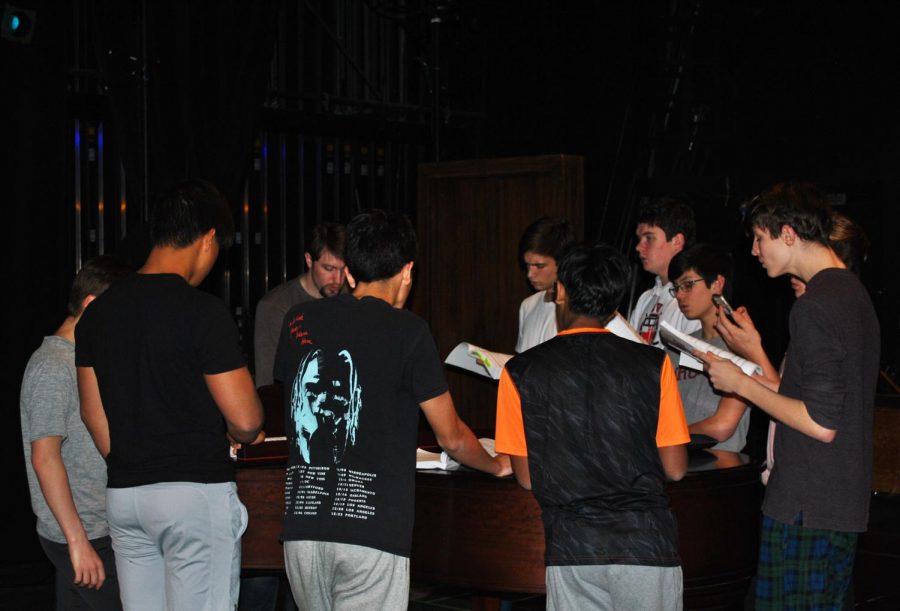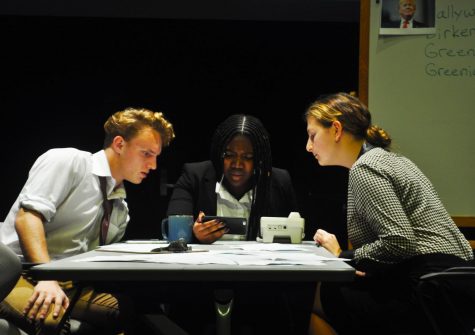Legally Blonde: Groton Theater Tackles Stereotypes
Cast members gathered around the piano to practice songs for the winter musical, Legally Blonde.
If you’re finding the winter long and mundane, you should look out for this term’s musical, Legally Blonde. “Our company is taking on incredibly challenging material… and they are coming at that material with real passion and focus and creativity,” said Director of Theater Laurie Sales.
Legally Blonde is a comedy that follows Elle Woods (played by Caroline Drapeau ’21), the president of her sorority at the University of California, Los Angeles, as she makes her way to Harvard Law School to win back her ex-boyfriend.
Alex Brown ’21, who plays Nikos Argitakos, said that the musical is “absolutely hilarious.” When asked about what he loved most about Legally Blonde, he said, “Honestly, working every day with everybody in the cast is just so fun. I love every single cast member and I truly think this musical will be phenomenal.”
“I would say the company is thriving… We’ve two dogs and eight faculty members and a few students who make cameos. The show is, at heart, a musical comedy. It has so much toe-tapping entertainment. If you are like me, you’ll end up singing the songs on the way out,” said Laurie.
While many describe the musical as humorous, they also argue that Legally Blonde explores the importance of addressing stereotypes.
“Most of the characters in the musical are stereotypes,” said Laurie. “It’s dangerous but it’s funny. It’s playing on stereotypes. But while you are playing with them, you are also thinking about them. There is value in thinking about them. This musical ultimately challenges these stereotypes.”
Some of the stereotypical characters include an Indian student at Harvard, Sundeep Padamadan, played by Anuj Agarwal ’21, and Enid Hoopes, an aggressive lesbian feminist played by Claire Holding ’21. The show offers the rare chance for Groton students to scrutinize these caricatures for months on end and recognize what in them is familiar, what is outlandish and what they say about the community.
Laurie initially had a different musical in mind for this winter, Anything Goes. She decided not to use it because there was a racially offensive plot point that Laurie could not get permission to manipulate or remove. Two of the characters in the show (characters played by white actors at the time of the show’s release) offensively portray Chinese characters with poor English, heavy stage make-up and clumsy physicality used for laughs.
In the end, Laurie switched to Legally Blonde, stating that it featured “a strong female character,” something the audience would find “inspiring.”
While at first glance Legally Blonde may seem like a story about “a dumb girl who ends up not being that dumb and is actually a heroine,” Laurie said that Legally Blonde also raises the question, “What’s so bad about being a blonde pretty girl who cares about fashion and also wants to be loved?”
Legally Blonde challenges negative stereotypes associated with being blonde: Elle has both beauty and brains. The musical also emphasizes the different ways people interact with each other.
“In the musical, look at the way women treat each other: women can break each other and build each other up,” said Laurie.
From Elle’s loyal sorority sisters to unexpected female friendships forged at Harvard, messages of sisterhood are consistent throughout the musical.
So watch out, Groton: Legally Blonde will be both a hilarious musical comedy and an exploration of the presence and dismantling of stereotypes.





